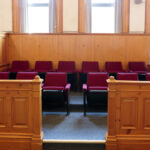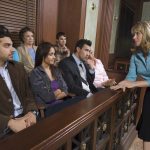The Offence of Juror Misconduct in New South Wales

The trial of two men accused of sexual assault has been vacated and a fourth trial ordered as a result of a ‘flagrant breach’ of the trial judge’s directions, which was found to have amounted to juror misconduct.
The jury in the Victorian County Court trial was considered a mistrial and abandoned again this week, without verdict after one of the juror’s conducted his own ‘experiment’ directly in relation to evidence heard at the trial.
This went against the specific directions of presiding Judge Mark Dean who was clear in his instructions that jurors should only deliberate on evidence and material presented in court.
A fourth trial
The fact that the case needs to be heard in a fourth trial has a significant impact on all those involved, especially the defendant, but also the complainant, court system and wider community.
The alleged offending occurred in 2016, some 6 years ago – and the defendants will need once again go through all that comes with facing a serious criminal trial.
The juror’s conduct will be referred to the Juries Commissioner, who will decide whether to refer it to Victoria Police for the investigation of criminal charges.
The two accused men remain on bail, and are due to appear in court yet again later this year.
The alleged offences
The allegations relate to an incident which allegedly occurred in a caravan at a joint 21st and 60th birthday party, on a rural property near Balmora in Victoria.
The issue of sexual intercourse having taken place is not in contention; rather, the issue is whether that intercourse was consensual.
The men were found not guilty after the first trial, after which fresh evidence prompted a new trial being ordered. The second trial was vacated (cancelled) after a juror tested positive to Covid-19.
The third trial could not proceed after a juror disobeyed the Judge’s instructions.
Judge Mark Dean said the juror at fault had not acted “maliciously”, but had breached clear instructions resulting in the trial being unable to proceed.
The saga has reignited debate about whether it is just to subject defendants to multiple trials, especially given these men were found not guilty after their first trial.
Discussions around the question of ‘double-jeopardy’ have also been triggered by the case, although jurisdictions across Australia have brought in laws which significantly dilute this fundamental principle of criminal justice, resulting in defendants who have been acquitted being retried as a result of ‘fresh evidence’ surfacing after trial – including in dubious circumstances where one would have thought diligent investigators would have been expected to obtain that material much earlier.
Juror misconduct and the impact on trials
It is becoming increasingly easy for jurors to conduct their own research and information with the internet, media and social media– and this is problematic because cases should be decided only upon the evidence that is presented within the courtroom.
In the UK, in 2019 a specific law was passed to criminalise jurors who engage in misconduct, including research cases, visit a location, or conduct their own experiments, or share information, contact the defendant or a witness while in-service. The law has also been developed to give judges powers to require jurors to surrender mobile phones and other devices.
The offence of juror misconduct in New South Wales
Making an inquiry for the purpose of obtaining information about an accused, or any matters relevant to a trial except in the proper exercise of a juror’s function is an offence under section 68C of the Jury Act 1977 (NSW) which attracts a maximum penalty of 5 years in prison and/or a $5,500 fine.
The offence applies to a juror from the time the juror is sworn in until he or she, or the jury of which he or she is a member, is discharged by the court.
‘Making an enquiry’ encompasses:
(a) asking a question of any person, including a spouse or family member who is not a juror,
(b) conducting any research, for example, by searching an electronic database for information (such as by using the Internet),
(c) viewing or inspecting any place or object,
(d) conducting an experiment, or
(e) causing someone else to make an inquiry.
The offence further covers anything done by a juror in contravention of a judge’s direction/s.
It does not prohibit a juror from making an enquiry:
(a) of the court, or of another member of the jury, in the proper exercise of his or her functions as a juror, or
(b) that is authorised by the court.








